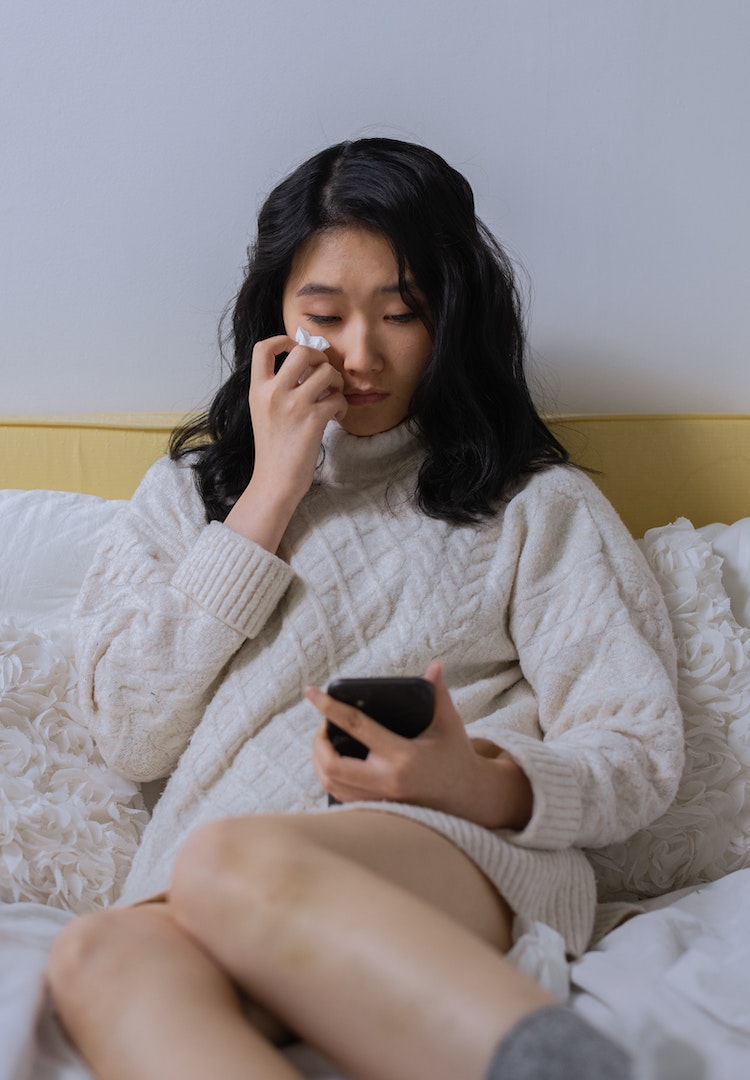Why do some people cry after sex?
WORDS BY ALICE CHILD
“Crying could be the physical release you’re craving.”
Content warning: This article discusses sexual abuse and trauma.
Sydney-based somatic sexologist and sex and intimacy coach Alice Child is the founder of Vulva Dialogues. She works with individuals, couples and groups, helping people achieve happier, healthier and more fulfilled sex lives – whatever that means for them. Visit her website for more.
If you’ve recently burst into tears after sex, you might be asking – is this normal? The answer is yes. It’s a lot more common than you might think and you’re definitely not alone. But when you cry after sex, it’s understandable if it takes you (and your partner) by surprise, especially if the sex itself was great.
Many people have sex to connect and feel closer to their partners. Crying after sex can be distressing for both partners, as it interrupts important bonding time together. So what’s going on if this is happening to you?
Postcoital dysphoria
Crying after sex is also known as postcoital dysphoria (PCD). Its symptoms include tears, sadness, mood changes and/or a rush of emotion after consensual sex, even if the experience itself was positive.
It can feel different for everyone, and the tears may or may not be accompanied by sad emotions. They could be tears of happiness, relief, or release – they also might indicate a simple physical bodily reaction. It can happen to anyone regardless of gender and sexual identity and can happen with or without an orgasm occurring.
How common is crying after sex?
It’s far more common than you might think. In a 2015 study, researchers surveyed 230 heterosexual females and found that 46 per cent of respondents reported experiencing PCD symptoms at least once in their lifetime. Another 2018 study found that out of 1208 males, 41 per cent of respondents experienced PCD, with up to 4 per cent experiencing PCD regularly.
What are the causes?
There are many different reasons why you might be experiencing PCD.
Depression and medication
A 2019 study found that “current psychological distress” was the variable most strongly associated with PCT, while depression was the most common mental health condition the participants reported.
Other symptoms of depression include sadness, frustration, irritability, anger, anxiety, difficulty sleeping, restlessness, fatigue, loss of concentration or memory, appetite changes, unexplained aches or pains and loss of interest in activities (like sex).
For people with depression or anxiety, the release of hormones in the brain and body during and after sex might feel overwhelming and can lead to a crash of emotions.
Anxiety
Crying is a natural reaction to stress, fear and anxiety. If you’re feeling one of these emotions, it can be very difficult to put it aside and get in the mood for sex. People might find their minds wandering, making it hard to stay present and ‘in the moment’ during intimacy.
Performance anxiety is also very common for people of all genders. People worry if they’re ‘doing it right’, giving enough pleasure to their partner, if their body looks good naked or whether they’ll be able to reach orgasm, maintain an erection or ejaculate too quickly.
In these instances, I would recommend seeing a somatic sex coach or sex educator (like me). We teach mindfulness exercises and tools to help people get out of their heads and reconnect with their bodies, aiding people in overcoming sexual concerns or distractions.
Hormone changes
During sex, many hormones and neurotransmitters are released within the brain and body. While these can feel incredibly pleasurable and can lead to positive mood changes, they might also trigger intense and fluctuating emotions – which can lead to tears.
In particular, orgasms might be responsible for your PCD. This is because orgasms can actually cause your levels of dopamine and oxytocin to drop. A severe drop in these hormones might lead to a mood crash and tearfulness. If your hormones are fluctuating due to your menstrual cycle, menopause, pregnancy, or childbirth, this could also trigger PCD.
Happiness
Crying isn’t just prompted by sadness – many people also get tearful when they’re happy. Sex and intimacy can lead to increased feelings of connection, love and joy, which might lead to waterworks.
In addition, sex, intimacy and orgasms release a lot of feel-good chemicals into the body, like oxytocin, serotonin and endorphins. While the presence of these hormones might feel relaxing and blissful to some, they also might lead to an overwhelming rush of emotions – leading to tears.
Physical overwhelm and release
In addition to your mind, your body might feel overwhelmed after sex. With all the chemicals and adrenaline coursing through your body after a great orgasm or an exciting new sexual experience, is it surprising that your body might need a physical release? It’s why many people start giggling or crying post-coitus.
Crying is a physical response that helps the body reduce tension and intense physical arousal. Suddenly letting go of all that pent-up sexual energy could be a physical release that mechanically brings you to tears – like a cathartic release.
Frustration
If you’ve been unable to build the level of arousal, desire or pleasure in your body you were hoping for, you might end the interaction with disappointment. Crying could be the physical release you’re craving.
Emotional confusion or relationship issues
Many people are left feeling a bit confused after sex. Were you getting mixed signals from your partner? Did they do something that surprised you?
Similarly, if the relationship with this person is complicated or there’s confusion about how you each feel about each other, having sex might also leave you feeling upset.
Pain
Sex should never be painful. Sadly, far too many people experience painful sex for many reasons like lack of lubrication, UTIs, vaginismus, birth trauma, surgery, STIs, skin irritation, lack of engorgement/arousal or endometriosis. If you’ve experienced uncomfortable sex for any reason, crying is a perfectly natural and understandable reaction.
Sexual shame and guilt
In our society, sexual shame is still pervasive. In some religious or conservative environments, people are taught that seeking sexual pleasure is wrong, dirty, animalistic, or shameful. This is particularly true for members of the LGBTQIA+ community.
As a result, when we experience sex and pleasure as adults, those feelings of shame and guilt can bubble to the surface – especially if we’re engaging in sex that might be viewed as taboo, like kinky sex or BDSM.
Additionally, for those with body image issues, showing their naked body might elicit an overwhelming emotional response.
Trauma or sexual abuse
If you’ve got a history of sexual abuse or trauma, sex can be triggering. Certain positions, sensations, or smells can bring you right back into that traumatic experience. People might not even be conscious of these memories before they start responding to them emotionally.
This can be extremely scary and vulnerable. Tears, fear, disorientation and feeling an emotional shutdown are all possible symptoms of a trauma response. If this is happening to you, I’d recommend seeing a therapist with specialist trauma training to help you develop your own grounding skills and coping mechanisms.
What can you do about it?
Depending on which of the above you identify with, crying after sex might not feel like a problem that you need to fix. For some people, it can be a satisfying cathartic emotional release. Ask yourself: did it feel upsetting or distressing? Did crying add to the tension you were experiencing, or did it make you feel better? If you would like to lower the chances of post-coitus tears, there are tools you can use.
Go slowly
Reflect on what you were experiencing physically and emotionally in your body when you cried after sex. Take your time, and explore without judgement. If you’re trying lots of amazing new things sexually and you find yourself regularly crying afterwards, you might want to consider whether you (and your body) are overwhelmed. You might need to slow down and take things at your own pace.
Communicate with your partner
As always, communication is key! If you know this often happens to you, try and tell your partner before you have sex. You might explain to them that it’s relatively common and for you, it doesn’t mean that anything is wrong. Otherwise, they could be left feeling worried or concerned they did something that you didn’t like.
If you often experience PCD after a particularly intense or pleasurable sexual experience, you could tell them that tears for you are a sign that the sex was amazing! Who wouldn’t want to hear that?
If the issue is more complicated and there are unresolved relationship issues at play, consider seeing a counsellor or sex coach like myself to help you navigate these conversations.
Learn your needs
Learn what you require before, during and after sex, and communicate this clearly to your partner. Do you need a cuddle? A sugar hit? A joke or a laugh? Or do you need to be left alone?
See an expert
For physical pain during or after sex, see a medical professional. Many physical causes of sexual pain are treatable. If you’re experiencing changes to your hormone levels due to childbirth, menopause, postnatal depression, or medication changes see your doctor or specialist. For anxiety and depression, talk to your psychologist.
For trauma-induced PCD, consider seeing a trauma therapist to help you develop your own grounding and coping skills. For anything else, consider seeing a sex coach and educator like me! Talking about sex is a normal, healthy part of life. Learn how to bring more pleasure, curiosity and fun into your life – leaving the pressure behind.
Alice Child is a Sydney-based somatic sexologist and sex and intimacy coach and the founder of Vulva Dialogues.










